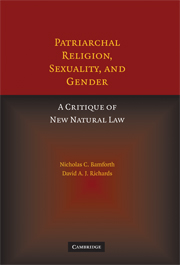Book contents
- Frontmatter
- Contents
- Acknowledgments
- 1 New Natural Law in Context
- 2 Criteria for Evaluating New Natural Law
- 3 The Architecture and Reach of New Natural Law
- 4 Internal Consistency (1): Is New Natural Law Secular?
- 5 Internal Consistency (2): New Natural Law and Thomas Aquinas
- 6 Substantive Appeal (1): What's Wrong with Homophobia and Sexism?
- 7 Substantive Appeal (2): New Natural Law, Sexism, and Homophobia
- 8 Moral Absolutes and the Possible Fundamentalism of New Natural Law
- 9 New Natural Law and Patriarchal Religion
- 10 Concluding Observasions, and Christian Alternatives to New Natural Law
- Bibliography
- Index
1 - New Natural Law in Context
Published online by Cambridge University Press: 14 August 2009
- Frontmatter
- Contents
- Acknowledgments
- 1 New Natural Law in Context
- 2 Criteria for Evaluating New Natural Law
- 3 The Architecture and Reach of New Natural Law
- 4 Internal Consistency (1): Is New Natural Law Secular?
- 5 Internal Consistency (2): New Natural Law and Thomas Aquinas
- 6 Substantive Appeal (1): What's Wrong with Homophobia and Sexism?
- 7 Substantive Appeal (2): New Natural Law, Sexism, and Homophobia
- 8 Moral Absolutes and the Possible Fundamentalism of New Natural Law
- 9 New Natural Law and Patriarchal Religion
- 10 Concluding Observasions, and Christian Alternatives to New Natural Law
- Bibliography
- Index
Summary
In the past forty-odd years, a tight-knit and highly influential group of Catholic thinkers, labeled (for wont of a better term) the ‘new natural lawyers’ or the ‘Grisez School’, has sought to develop an integrated theory applicable to the fields of religion, ethics, philosophy and law. As E. M. Atkins suggests, the new natural lawyers' work “is characterized by a bold trust in reason, by elaborate systematization, by a willingness to apply theory to a wide range of specific practical problems, and by a strong allegiance to Roman Catholic moral teaching, interpreted in a conservative way”. New natural law provides a distinctive approach to Catholic theology, alongside a comprehensive account of ethics and the nature and proper purposes of law and legal systems. At a practical level, its proponents argue in favor of unilateral nuclear disarmament and against contraception, abortion, and any sexual activity outside of the heterosexual marriage (and many common sexual practices within it) – including all lesbian and gay sexual activity. The new natural lawyers have played a prominent part in doctrinal debates within the Roman Catholic Church, and have sought to influence the outcome of important constitutional cases in the United States by submitting closely argued amicus briefs. New natural law arguments were, for example, advanced before the United States Supreme Court in Lawrence v. Texas in support of a state anti-sodomy statute that was later held to violate the Fourteenth Amendment due process guarantee, and at the state supreme court level in Romer v. Evans in support of a measure that was later found by the U.S. Supreme Court to display unconstitutional “animus” towards lesbians and gay men.
- Type
- Chapter
- Information
- Patriarchal Religion, Sexuality, and GenderA Critique of New Natural Law, pp. 1 - 16Publisher: Cambridge University PressPrint publication year: 2007



